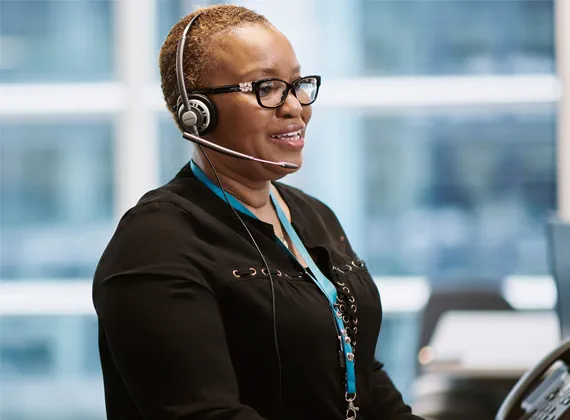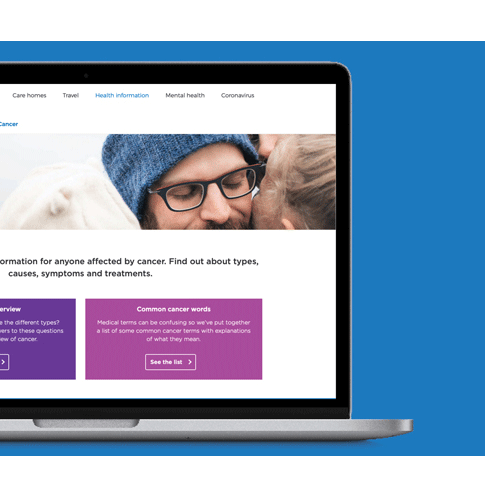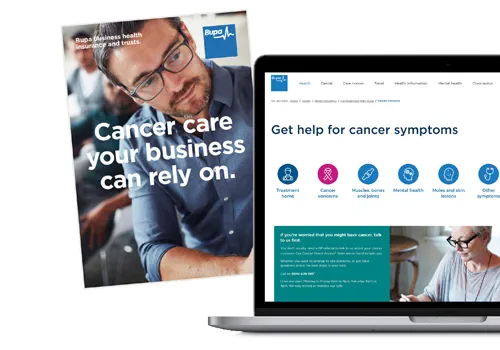The hidden C
Working together
for health awareness
If you have cancer you need to know about it fast. Early diagnosis can reduce the need for invasive surgery, radiotherapy and chemotherapy — and in most cases, increase chances of survival.
Our lives are busy and it can be easy to delay a trip to the doctor, or ignore something you notice that is different about your health or your body. And with cancer manifesting itself in so many ways, it can be hard to know when something needs to be checked.
A few weeks into the first lockdown, Zahra found a lump in her breast. She had been experiencing some breast pain and put off seeking help — like many others during the pandemic.
![]()
My initial thought was to ignore it. I had a week of back-to-back meetings and literally that morning I got a text from the GP saying ‘stay away where possible’.
![]()

Zahra, 33
Financial services company employee
Like many people who noticed cancer symptoms during the pandemic, Zahra was worried about putting her family at increased risk of COVID-19, or taking up frontline healthcare workers’ time unnecessarily.
Fortunately, she had just attended a health awareness programme organised by her employer, which helped her understand the warning signs of cancer and how to get help through the company’s medical scheme.
After finding out about Bupa’s Direct Access services at the health awareness programme, Zahra called Bupa and within 10 minutes of speaking to a trained health adviser, she was booked in for a consultation at a local hospital.
![]()
Within less than 24 hours of finding the lump, I had the tests and was thankfully given the all clear. Even if they had found something, I knew by that point that I was in the system and that I would be taken care of.
![]()
If a customer contacts Bupa through our Direct Access service as Zahra did — and a nurse identifies red flags which suggest further investigation is needed — tests and a consultation with a specialist are booked there and then. And even if symptoms mean we can’t offer a private referral, we’ll advise the customer to see their GP and offer a call back within 14 days for further support. This is a lot faster than the national targets that aim for patients to begin treatment no more than two months (62 days) from the date of an urgent referral from a GP.1
Statistics can’t show the emotional impact cancer has on people, including the fear and sense of isolation that surrounds the wait for tests and answers. But fast-track diagnosis and a supportive employer can dramatically reduce this anxiety and help deliver the best care, as Zahra discovered.
Direct Access removed the stress of speaking to her employer — as Zahra explains, the conversation with her manager may have been different if that service wasn’t there. Her manager’s response was, “OK, something’s going on with my team member, and because we’ve got health insurance she’s being supported and seen promptly.”
![]()
OK, something’s going on with my team member, and because we’ve got health insurance she’s being supported and seen promptly.
![]()


James Sherwood
Bupa Managing Director of Healthcare Management
![]()
Cancer is life-changing, personally and professionally. Besides dealing with the difficult effects of treatment and the disease itself, people may be worried about money, or grappling with difficult decisions about their future.
![]()
“We’re seeing leading organisations shift towards providing a more holistic approach with support that looks at the whole person, not just the cancer treatment — by offering occupational health, mental and emotional support, as well as access to the right clinical care.
“This is helping to reduce a lot of employee anxiety by creating an environment where cancer patients feel supported and able to continue to work, if they wish. For many people, this can be very helpful both financially and socially. Research by Macmillan Cancer Support shows that 85% of people who are in work when they are diagnosed say it’s important to keep working.2
“Talking about cancer is never easy and it can be especially hard in the workplace, which is why we’ve created a guide for managers on how best to support your teams (PDF 0.3MB).”

James believes,
“With so many people reluctant to burden their GP, or having put off discussing symptoms during the pandemic, employers now have an important role to play in raising awareness of cancer symptoms, promoting the services available through company health insurance and ensuring employees are diagnosed as early as possible.
“You can support colleagues by signposting to resources in the Bupa Cancer Hub and by raising awareness of the benefits of services such as Direct Access and remote diagnosis — as well as the additional cancer screening which is included in routine health assessments.”

James adds,
“We know that waiting lists — and the backlog of patients needing cancer treatment — are a concern, and we are continuing to evolve our pathways to improve ease of access and patient outcomes.
“Our Specialist Centres for Breast Cancer aim to provide the highest standard of care, while complementing and further improving the pathway for our customers - including those choosing Direct Access - so that people get peace of mind, or a diagnosis and treatment as soon as possible.”
He emphasises, “Collaboration is the key. We can improve outcomes and minimise anxiety and disruption by working together to raise awareness of cancer symptoms and the rapid access to diagnostic and specialist services available to colleagues.”
Cancer resources
For more information about how we support our customers with cancer, take a look at our cancer and health insurance page or our get treatment page designed to improve access to care and wellbeing support for customers with concerns over cancer, signposting them to our direct access service.


